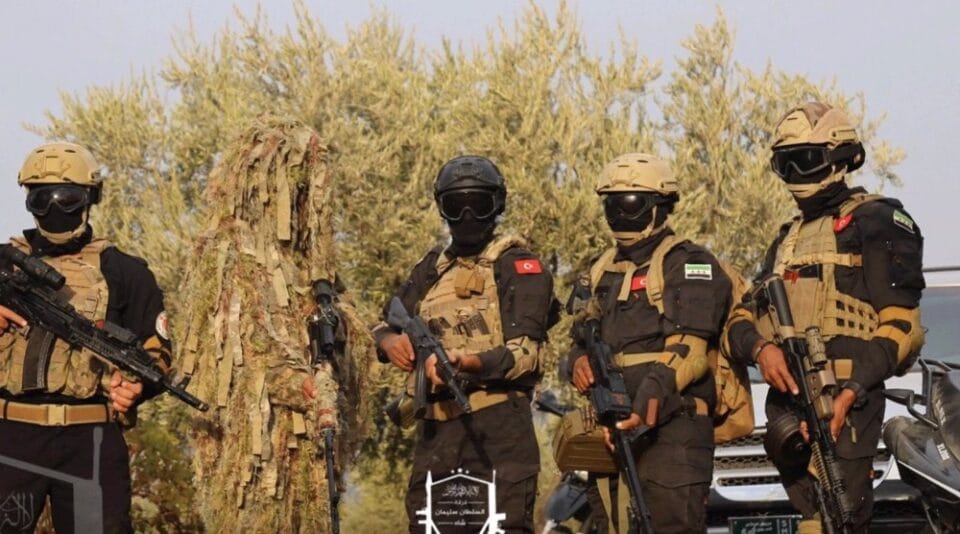The EU has imposed sanctions on the Syrian military dominated by Hayat Tahrir al-Sham (HTS) militants for their role in the massacre of Alawite civilians on the country’s coast earlier this year.
According to the EU official journal, the 27-member bloc placed sanctions on the Sultan Suleiman Shah Brigade, the Hamza Division, and the Sultan Murad Division.
The embargoes were announced due to their targeting of “civilians and especially the Alawite community, including by committing arbitrary killings.”
The Sultan Suleiman Shah founder Mohammad Hussein al-Jasim and Hamza Division chief Sayf Boulad Abu Bakr were hit with asset freezes and bans on entering the EU.
The official journal went on to say that they committed “serious human rights abuses in Syria, including torture and arbitrary killings of civilians.”
The three factions were formerly part of armed groups which were known as the Syrian National Army (SNA).
These factions were involved in the massacres committed by Damascus’s forces against Alawite civilians on the Syrian coast in early March.
Thousands were killed, and the results of a government-led investigation into the massacres have not been made clear.
According to several reports, Syrian forces have continued to carry out sectarian killings, kidnappings, and persecution across Syria, targeting Alawites and other minorities.
According to several reports, Syrian forces, dominated by the HTS and other militant groups, have continued to carry out sectarian killings, kidnappings, and persecution across Syria, targeting Alawites and other minorities.
The HTS militant group seized control of Damascus on December 8, 2024, culminating a swift offensive that had begun in the northwestern province of Aleppo just two weeks earlier and ultimately brought an end to Assad’s 24-year rule.
The HTS administration has since been involved in flagrant violations of human rights in Syria, particularly against minorities, namely Syria’s Alawite minority, drawing widespread condemnations from the international community.
A series of violent clashes also between HTS gunmen and members of a Druze community in Syria earlier this month left dozens of people dead and raised fears of deadly sectarian violence.
The Druze minority had a history of supporting the Assad government and standing against Israeli occupation and expansionist policies, including in the occupied Golan Heights.
The UK and EU states have been gradually lifting Syria sanctions since the start of this year. Earlier this month, US President Donald Trump announced a decision to lift all sanctions against the administration of Syria’s self-proclaimed president, Abu Mohammed al-Jolani.
US consortium inks $7 billion energy deal with HTS administration
On Thursday, the the HTS administration signed a $7 billion energy deal with a consortium of US companies and some regional firms.
The agreement was sealed at the presidential palace in Damascus in the presence of Jolani and US ambassador Thomas Barrack.
Sources said the plants, which aim to generate 5,000 megawatts, would use US and European technology.
The consortium is led by Qatar’s UCC Concession Investments and includes Turkey’s Kalyon GES Enerji Yatirimlari and Cengiz Enerji, along with Power International USA.
Damascus used to receive the bulk of its oil for power generation from Iran, but supplies have been cut off since HTS militants took over the Arab country last year.
Syria, under Jolani’s rule, has left people with up to 20 hours of daily blackouts in recent months.
Separately, Jolani met Barrack on Thursday at the newly reopened US Embassy compound in Damascus.
Jolani, once affiliated with al-Qaeda and Daesh, led the HTS militants in overthrowing the government of President Bashar al-Assad last year.
After the takeover in December, though, the HTS and its chief Jolani began efforts, which observers have defined as its bid to deflect attention from its past, including by trying to formally communicate with Western states such as France.
The latest developments come as the US encourages the new HTS rulers in Damascus to establish relations with Israel.
Trump announced that he would lift the entirety of Washington’s sanctions against Syria after the new administration in the Arab country reportedly proposed making “peace” with the Israeli regime, the US’s closest regional ally.
Trump indicated after meeting Jolani during a recent tour of some Arab states of the Persian Gulf region that the Syrian leader was willing to eventually normalize ties with Israel.
Trump announced that he would lift the entirety of Washington’s sanctions against Syria after the new administration in the Arab country reportedly proposed making “peace” with the Israeli regime, the US’s closest regional ally.
The US president also signaled to the Israeli regime that it should work to reach an understanding with HTS leaders.
Israel, at the same time, has also been lobbying Washington to keep the country weak and decentralized.
Israel and Syria are in direct contact and have, in recent weeks, held face-to-face meetings after Syria’s al-Jolani voiced a desire to eventually normalize ties with the regime.
